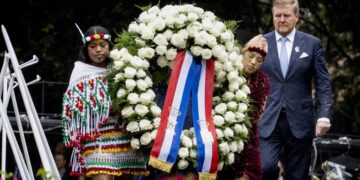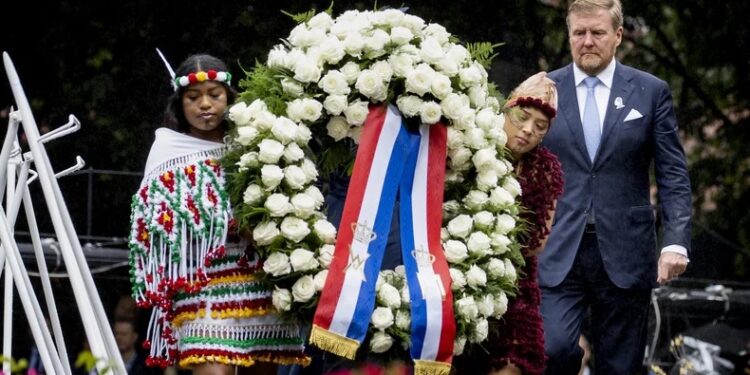By John Ikani
Dutch King Willem-Alexander has offered a heartfelt apology for the Netherlands’ historical connection to slavery and the lingering impact it continues to have on society.
Speaking on the 160th anniversary of the abolition of slavery in the Netherlands and its former Caribbean colonies, the monarch expressed remorse for the grave injustice.
“In remembrance of our nation’s history of slavery, I seek forgiveness for this crime against humanity,” the king declared emotionally, acknowledging his role as both the nation’s leader and a government member.
He candidly admitted to carrying the weight of those solemn words in his heart and soul.
While the king’s apology resonated with the crowds at the national slavery monument in Oosterpark, he recognized that racism remains a persistent issue in Dutch society.
Despite not garnering universal support for his apology, he emphasized the undeniable progress made as “keti koti,” or “the chain is broken,” symbolizing the liberation from enslavement on July 1st – a day dedicated to commemorating slavery and celebrating freedom in Surinamese tradition.
Although slavery ended in Suriname and Dutch Caribbean colonies on July 1, 1863, many enslaved laborers endured another decade of forced plantation work.
The pivotal moment has prompted a broader reassessment of the Netherlands’ colonial past, confronting its role in the Atlantic slave trade and the subjugation in its former Asian colonies.
In 2020, King Willem-Alexander issued an apology in Indonesia for the “excessive violence” during the Dutch colonial rule, acknowledging historical wrongdoings.
Also, Prime Minister Mark Rutte apologized for the Dutch state’s involvement in the Atlantic slave trade, acknowledging the country’s profiteering from the dark period.
However, the government has declined to provide reparations, contrary to recommendations by an advisory panel in 2021.
Demonstrating a commitment to understanding the royal House of Orange-Nassau’s connection to slavery, King Willem-Alexander commissioned a comprehensive study spanning from the late 16th century to the present.
The study’s findings, anticipated to be announced in 2025, could shed light on the role the royal family played in slavery, including their profits from the Dutch East India Company.
Similarly, the British royal family has faced scrutiny for its ties to the transatlantic slave trade.
Research by The Guardian exposed links between the British monarchy and the Royal African Company (RAC), which was established in 1660 to trade along the west African coast and later involved in capturing and enslaving thousands of Africans.
The revelation revealed that shares in the RAC were transferred to King Charles III’s ancestor, William III, in 1689 from Edward Colston, the company’s infamous deputy governor.
Further investigation indicated that King Charles III’s lineage was connected to a Virginia tobacco plantation owner named Edward Porteus, who bought at least 200 enslaved people from the Royal African Company in 1686.


































